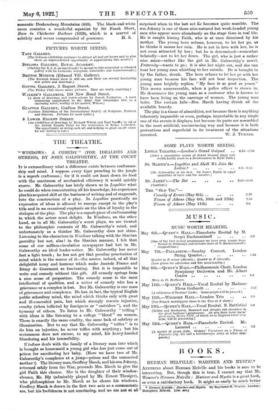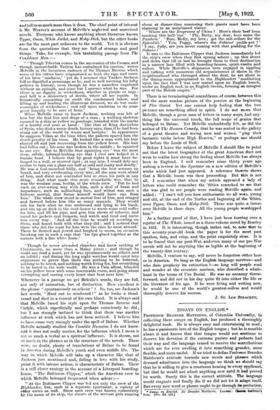BOOKS.
HERMAN MELVIIJE : MAR.TNER AND MYSTIC.* ANYTHING about Herman Melville and his books is sure to be interesting. But, though this is true, I cannot say that Mr.
Weaver's Herman :.Mariner and Mystic is a great book, or even a satisfactory book. It might so easily be much better • Herman Itsieflis: Marlicerandlligtlitt. By Raymond M. Weaver. London Humphrey las. bets] .and tell us so much more than it aces. The chief point of interest is Mr. Weaver's account of Melville's neglected and unrevived novels. Everyone who knows anything -about literature knows Typee, Omoo, White Jacket, and Mobs-Dick, but the other books are for the most part unknown to the world. Yet it is obvious from the quotations that. they are full of strange and good things. Take, for example, this tantalizing passage from The Confidence Man " ' Though Tiberius comes in the succession of the Ccesars, and though unmatchable Tacitus has embalmed his carrion,' writes Melville in the luxurious cadence of Sir Thomas Browne which some of his critics have stigmatised as both the sign and cause of his later madness," yet do I account this Yankee Jackson full as dignified a personage as he, and as well meriting his lofty gallows in history, even though he was a nameless vagabond without an epitaph, and none but I narrate what he was. For there is no dignity in wickedness, whether in purple or raga : and hell is a democracy of devils, where all are equals. In historically canonising on earth the condemned below, and lifting up and landing the illustrious damned, we do but make ensamples of wickedness ; and call upon ambition to do some great iniquity to be sure of fame.' When Melville came to know Jackson, nothing was left of Lim but the foul lees and dregs of a man ; a walking skeleton encased in a skin as yellow as gamboge, branded with the marks of a fearful end near at hand. : like that of Kin°. Antioehus of Syria, who died a worse death, history says, than if had been stung out of the world by wasps-and hornets.' In appearance he suggests Villon at the time when the gallows spared him the death-penalty of his vices. He looked like a man with his hair shaved off and just recovering from the yellow fever. His hair had fallen out ; his nose was broken in the middle ; he squinted in one eve. But to Melville that squinting eye was the most deep, subtle, infernal-looking eye that I ever saw lodged in a human head. I believe that by good rights it must have be- longed to a wolf, or starved tiger ; at any rate, I would defy any oculist to turn out a glass eye half so cold and snaky and deadly.' He was a foul-mouthed bully, and ' being the best seaman on board, and very overbearing every way, all the men were afraid of him, and durst not contradict him or cross his path in any thing.' And what made this more remarkable was, that he was the weakest Mail,. bodily, of the whole crew. ' But he had such an over-awing way with him, such a deal of brass and impudence, such an unflinching face, and withal was such a hideous mortal, that Satan himself would have run from him.' The whole crew stood in mortal fear of him, and cringed and fawned before him like so many spaniels. They would rub his back after he was undressed and lying in his bunk, and run up on deck to the cook-house to warm some cold coffee for him, and fill his pipe, and give him chews of tobacco, and mend his jackets and trousers, and watch and tend and nurse him every way. ' And. all the time he would sit scowling on thorn, and found fault with what they did ; and I noticed that those who did the most for him were the ones he most abused.' Those he flouted and jeered and laughed to scorn, on occasion breaking out in such a rage that his lips glued together at the corners with a fine white foam.'
Though he never attended churches and knew nothing of Christianity, no more than a Malay pirate t • and thdugh he could not read a word, yet he was spontaneously an atheist.and an infidel ; and during the long night watches would enter into arguments to prove that there was nothing to be believed, nothing to be loved, and nothing worth living for, but everything to be hated in the wide world. He was a Cain afloat, branded on his yellow brow with some inscrutable curse, and going about corrupting and searing every heart• that beat near him. '
Whenever in a passage we get Melville's words, they are full, not only of animation, but of distinction. How excellent is the phrase " spontaneously an atheist " ! So, too, are Jackson's last words, " Haul out to windward ! " as he broke a blood vessel and died in a torrent of his own blood. It is always said that Melville based his style upon Sir Thomas Browne and Carlyle, which superficially and perhaps consciously he did ; but I am strongly inclined to think that there was another influence at work which has not been noticed. I believe him to have come very strongly under the spell of Balzac. Whether Melville actually studied the Comedie Ifttmaine I do not know. and it does not really matter, for the influence which I mean is not so much a verbal as a spiritual influence. It is shown, not so much in the phrases as in the structure of the novels. There -were, no doubt, plenty of translations of Balzac to be found in America during Melville's youth and even middle life. The way in which Melville will take up a character like that of Jackson just mentioned and, falling in love with his study, paint it with intense ardour, is characteristic of Balza°. There is a still closeranalogy in the account of a Liverpool boarding- house, " The Baltimore Clipper," which the American crew to which Melville belonged frequented when ashore :— " At the Baltimore Clipper was fed not only the crew of the Highlander, but, each in a separate apartment, a variety of other crows as well. Since each crew was known collectively by the name of its ship, the shouts of the servant girls running about at dinner-time mustering their guests must have been.
alarming to an uninitiated visitor. .
Where are the Empresses of China ? Here's their beef been smoking this half-'our.' Fly, Betty, my dear, here some the Panthers.' Run; Molly, my love ; get the salt-cellars for the Spkndids." You, Peggy, where's the Siddons' pickle-pot ' ' I say, Judy, are you never coming with that pudding for the Sultans ? '
It was to the Baltimore Clipper that Jackson immediately led the ship's crew when they first sprang ashore : up this street and down that till at last he brought them to their destination in a narrow lane filled with boarding-houses, spirit-vaults and sailors. While Melville's shipmates were engaged in tippling and talking with numerous old acquaintances of theirs in the neighbourhood who thronged about the door, he sat alone in the dining-room appropriated to the Highlanders meditating upon the fact that I was now seated upon an English bench, under an English roof, in an English tavern, forming an integral part of the British empire.' " There is no terminological resemblance, of course, between this and the more sombre picture of the pension at the beginning of Pere Goriot. Yet one cannot help feeling that the two
pictures are something allied in spirit. I do not mean that Melville, though a great man of letters in many ways, had any- thing like the universal touch, the full scope of genius that belonged to Balzac. Yet Melville undoubtedly felt, as did the
author of Th?. Human Comedy, that he was seated in the gallery of a great theatre and seeing men and women " play their fantastic tricks before High Heaven," or perhaps one should say before the Lords of HelL Before I leave the subject of Melville I should like to point out that the latest biographer of the great American does not seem to realize how strong the feeling about Melville has always been in England. I well remember some thirty years ago writing a review in the Spectator on a new edition of Melville's
works which had just appeared. A reference thereto shows that a Melville boom was then proceeding. But this is not
all. I remember that when my article appeared a lady of letters who could remember the 'fifties remarked to ate that she was glad to see people were reading Melville again. and added : " I can't tell you how enthusiastic we all were, young and old, at the end of the 'forties and beginning of the 'fifties, over Typee, Omoo, and Mobs-Dick. There was quite a furore over Melville in those days. All the young people worshipped
him."
As a further proof of that, I have just been turning over a
reprint of The Whale, issued as a three-volume novel by Bentley in 1851. It is interesting, though rather sad, to note that in this seventy-year-old • book the paper is for the most part spotless, firm, and crisp, and the print exquisitely oleer. It is to be feared that our post-War, and even many of our pre-War novels will not be anything like as legible at the beginning of
the twenty-first century.
Melville, I venture to say, will never be forgotten either here
or in America. So long as the English language survives—and who dare prophesy its extinction 1—so long will people read and wonder at the eccentric mariner, who described a whale- hunt in the terms of Urn Burial. He was an uncanny throw- forward, and did not in his day quite fit into either the life or the literature of his age. If he were living and writing now, he would be one of the world's greatest-sellers and would thoroughly deserve his success.
J. ST. LOE STRACHEY.



































 Previous page
Previous page